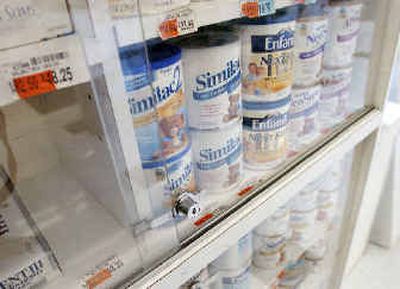Powdered baby formula goes behind the counter

BETHLEHEM, Pa. — Shoppers with little children might have noticed a change at the supermarket recently: The powdered baby formula has been locked up.
The high-priced item has long been an attractive target for shoplifters, who typically resell it on the black market at a reduced price or use it to cut drugs.
Now, some supermarkets are fighting back, putting formula under lock and key just as they did with cigarettes many years ago.
“There is a point in time when you have to protect your assets,” said Ted Seal, general manager of a Super Fresh store near Bethlehem that locked up its supply about a month ago because thieves had been stealing it by the caseload. Customers who want powdered formula now must ask a manager to unlock a case near the front.
At Albertson’s Inc., one of the nation’s largest supermarket chains, with more than 2,500 stores in 37 states, stores often keep a very small quantity on shelves, with signs directing customers to the service counter if they want more.
“It has been a problem for a number of years. People steal baby formula, take it to another store and return it” for cash, said Albertson’s spokesman Walt Rubel.
The Food Marketing Institute, an industry group that maintains a list of the 50 most stolen items from supermarkets, said that cases of Similac-brand powdered formula ranked No. 7 and individual cans of Similac followed at No. 8.
Powdered formula typically costs $10 to 30 a can, depending on size and brand, and $75 and up for a case.
In Tennessee, authorities made two traffic stops along interstate highways within the past year that netted more than 4,500 cans of stolen Similac and Enfamil powdered formula.
In North Carolina, seven Honduran immigrants were arrested last year for conspiring to steal and resell more than $14 million worth of baby formula and over-the-counter drugs. In April, they were given sentences ranging from probation to 12 years in prison and ordered deported.
FBI Director Robert Mueller has even linked stolen baby formula to terrorism, saying proceeds from black market sales have been used to support organizations such as Hamas and Hezbollah.
Millions of dollars’ worth of powdered formula is stolen every year, said Mardi Mountford, executive director for the International Formula Council, an association of infant formula manufacturers.
Sometimes the formula winds up on the gray market, in which shoplifters sell it at a discount to unauthorized distributors, which in turn sell it to small stores or at flea markets, she said.
Putting formula under lock and key “probably is a good deterrent, but it doesn’t make the consumers very happy because it costs them extra time,” Mountford said.
Weis Markets, which operates 156 stores in Pennsylvania and five surrounding states, said it employs a variety of methods to deter theft, including placing the formula section under video surveillance, teaching employees what to look out for and placing cases behind the cash registers.
“We recognize it is an inconvenience to our customers, but it is designed to prevent theft and if you are preventing theft, you are reducing costs,” spokesman Dennis Curtin said. Formula theft “has always been a problem, but in recent years it has accelerated and become more of a problem.”